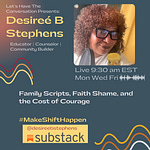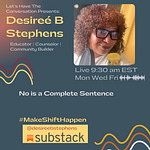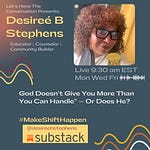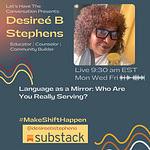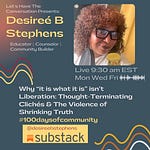Why Joy Is a Political Act
In a world that teaches us that liberation must be earned through struggle, pain, and exhaustion, choosing joy becomes an act of defiance. Joy is not frivolous. It is not an afterthought. Joy is fuel. Joy is strategy. Joy is the language of our ancestors reminding us that our existence was never meant to be confined by suffering.
“If we can’t imagine joy, how do we imagine freedom?”
This question lies at the heart of today’s conversation. If we are working toward a liberated future, that future must be soaked in joy—not just as a possibility, but as a present-day practice.
Joy Is Not a Luxury—It’s a Necessity
Liberation work is often heavy. We are unlearning, unpacking, unraveling—carrying ancestral pain and confronting systemic harm. And in the midst of it all, we can forget that joy is not a distraction from the work. It is the work.
Joy is not frivolous. It’s a form of resistance. Supremacy culture wants us tired, ashamed, and disconnected. But joy helps us remember why we fight—for each other, for beauty, for freedom, and for a future worth dreaming of.
Today’s conversation explored how joy functions as a radical, liberating practice. We talked about the joy that comes from community, from small moments, and from our power to choose rest, pleasure, and connection even in the face of oppression.
Free Preview
“So much of liberation work is rooted in this idea that we must grind our way through it—that we’re not doing it right unless we’re crying or suffering or sacrificing something. But that’s supremacy culture talking. The truth is: joy is a sign that you are already free in some way. Even if the world hasn't caught up yet. Even if your paycheck doesn’t reflect it. Even if you're still healing. Joy is proof that oppression hasn’t won.”
“So what if we made joy part of the strategy? What if it wasn’t just a byproduct or a celebration after the fight—but a practice within the fight? A pulse, a rhythm, a reminder that we’re doing this to build a world we actually want to live in—not just survive.”
3 Key Takeaways: The Role of Joy in Liberation
1️⃣ Joy Interrupts Supremacy Culture
Supremacy thrives on exhaustion, guilt, and grind. Joy disrupts that by rooting us in presence, gratitude, and abundance.
2️⃣ Collective Joy Builds Trust and Belonging
When we laugh, dance, eat, and celebrate together, we create the conditions for community to thrive—even amidst struggle.
3️⃣ Joy Is an Act of Reclamation
For Black, Indigenous, and marginalized folks especially, joy reclaims what oppression tried to steal: our humanity, our dreams, and our right to feel good.
An Invitation to Go Deeper
This conversation isn’t just about feeling good—it’s about designing systems that prioritize joy, pleasure, and care as essential components of liberation. In the full article, we’ll explore:
✔ How to practice joy as resistance
✔ Exercises to reconnect with your joy
✔ Real-life examples of joy in action across home, work, and self
✔ Guided reflections to uncover where you’ve abandoned joy—and how to reclaim it
👉 Join the movement of folks who are building communities where joy is a shared value.
If finances are a barrier, email me at Scholarships@DesireeBStephens.com and I’ll make sure you’re included.





